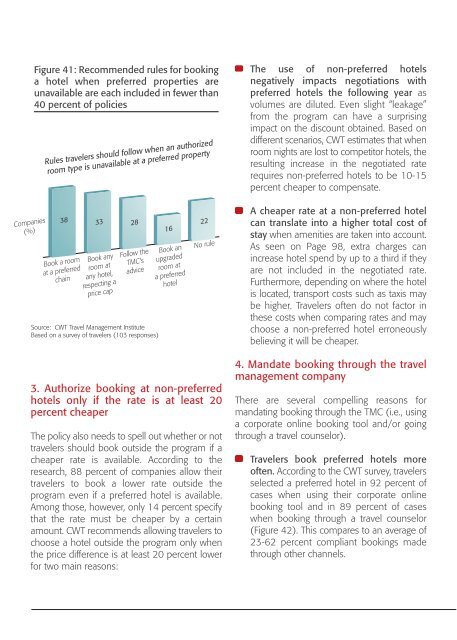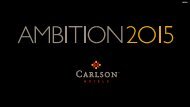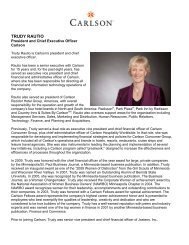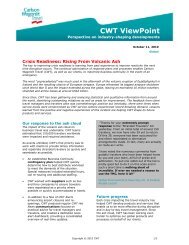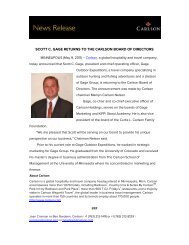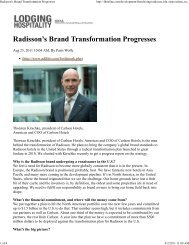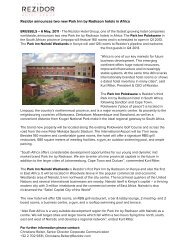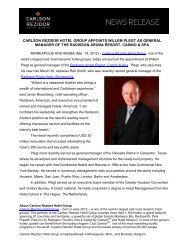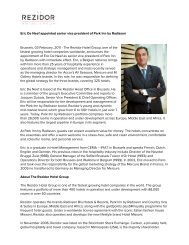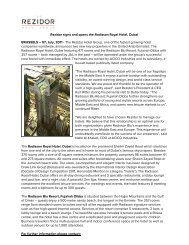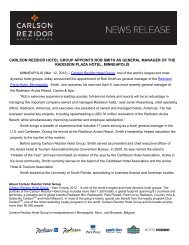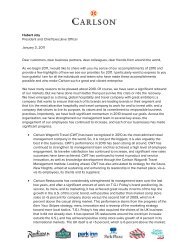Room for Savings: Optimizing Hotel Spend - Carlson
Room for Savings: Optimizing Hotel Spend - Carlson
Room for Savings: Optimizing Hotel Spend - Carlson
Create successful ePaper yourself
Turn your PDF publications into a flip-book with our unique Google optimized e-Paper software.
Figure 41: Recommended rules <strong>for</strong> booking<br />
a hotel when preferred properties are<br />
unavailable are each included in fewer than<br />
40 percent of policies<br />
Source: CWT Travel Management Institute<br />
Based on a survey of travelers (103 responses)<br />
3. Authorize booking at non-preferred<br />
hotels only if the rate is at least 20<br />
percent cheaper<br />
The policy also needs to spell out whether or not<br />
travelers should book outside the program if a<br />
cheaper rate is available. According to the<br />
research, 88 percent of companies allow their<br />
travelers to book a lower rate outside the<br />
program even if a preferred hotel is available.<br />
Among those, however, only 14 percent specify<br />
that the rate must be cheaper by a certain<br />
amount. CWT recommends allowing travelers to<br />
choose a hotel outside the program only when<br />
the price difference is at least 20 percent lower<br />
<strong>for</strong> two main reasons:<br />
The use of non-preferred hotels<br />
negatively impacts negotiations with<br />
preferred hotels the following year as<br />
volumes are diluted. Even slight “leakage”<br />
from the program can have a surprising<br />
impact on the discount obtained. Based on<br />
different scenarios, CWT estimates that when<br />
room nights are lost to competitor hotels, the<br />
resulting increase in the negotiated rate<br />
requires non-preferred hotels to be 10-15<br />
percent cheaper to compensate.<br />
A cheaper rate at a non-preferred hotel<br />
can translate into a higher total cost of<br />
stay when amenities are taken into account.<br />
As seen on Page 98, extra charges can<br />
increase hotel spend by up to a third if they<br />
are not included in the negotiated rate.<br />
Furthermore, depending on where the hotel<br />
is located, transport costs such as taxis may<br />
be higher. Travelers often do not factor in<br />
these costs when comparing rates and may<br />
choose a non-preferred hotel erroneously<br />
believing it will be cheaper.<br />
4. Mandate booking through the travel<br />
management company<br />
There are several compelling reasons <strong>for</strong><br />
mandating booking through the TMC (i.e., using<br />
a corporate online booking tool and/or going<br />
through a travel counselor).<br />
Travelers book preferred hotels more<br />
often. According to the CWT survey, travelers<br />
selected a preferred hotel in 92 percent of<br />
cases when using their corporate online<br />
booking tool and in 89 percent of cases<br />
when booking through a travel counselor<br />
(Figure 42). This compares to an average of<br />
23-62 percent compliant bookings made<br />
through other channels.


